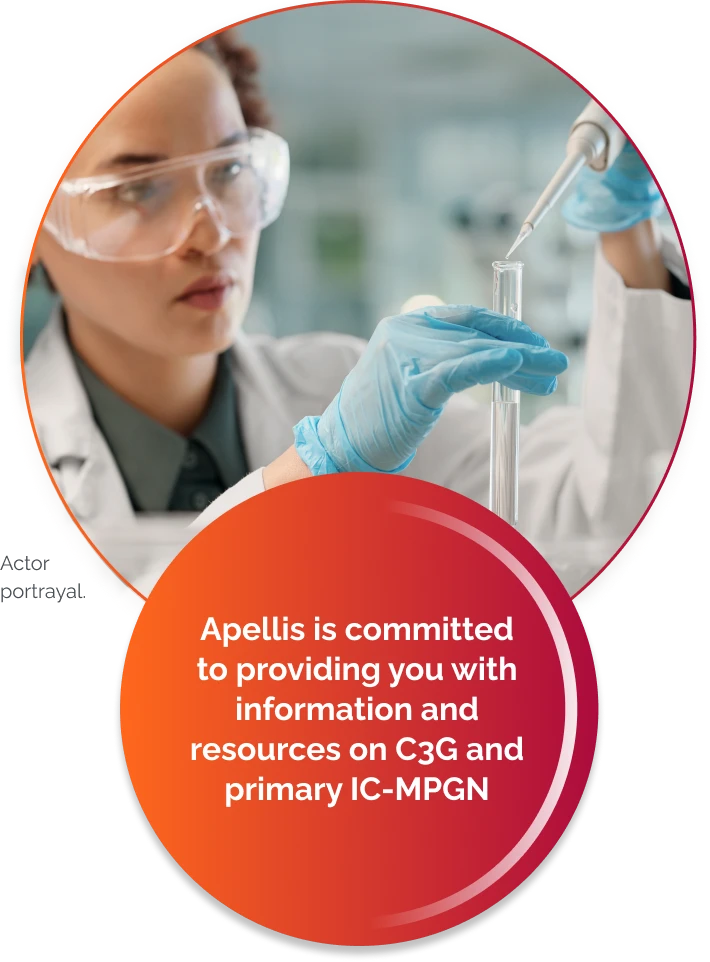Navigating life with C3G or primary IC-MPGN
You are not alone
Having C3G or primary IC-MPGN understandably raises questions about why these diseases occur. While we know they result from an overactivated complement system, the exact cause often remains unknown in many cases.
We know this can be overwhelming—but there’s support. We understand the ups and downs, and we’re here to help you make sense of it all. On this page, find information, practical tips, and resources to help you take care of your or your loved one’s health and well-being.
Actor portrayal.
Watch how Chase and his mom navigate life with C3G
Watch how Chase and his mom navigate life with C3G

Watch how Mary navigates life with C3G

Watch how Lindsey navigates life with C3G

More treatment approaches are urgently needed to manage these rare diseases effectively
Current management approaches are limited in the aspects of C3G and primary IC-MPGN they are able to address
- Some medications and dietary changes help manage symptoms of C3G and primary IC-MPGN. These include steroids, blood pressure medications, and reducing sodium in your diet
- Complement inhibitors vary and target different pathways in the complement system
- When these diseases are not adequately managed, they can lead to ongoing kidney inflammation and damage. This can cause kidney function to worsen over time, and potentially result in the need for dialysis and/or a kidney transplant
Because C3G and primary IC-MPGN are rare, complex, and affect people of all ages, it is clear that more research and work need to be done

A kidney transplant can restore function but is not a cure
For those living with advanced C3G or primary IC-MPGN, dialysis may become necessary when the kidneys can no longer effectively function. While dialysis can help manage kidney failure, it’s often a temporary measure, with many eventually considering a kidney transplant as the next step.
Almost 9 in 10 people with C3G see their disease return after a kidney transplant because the underlying cause—complement overactivation—remains
- The complement system can stay overactivated and continue to create a buildup of C3 fragments, causing injury in the transplanted kidney
People who receive a kidney transplant are often prescribed multiple, daily medications that are required to:
- Prevent transplant rejection
- Continue to manage symptoms of C3G or primary IC-MPGN
Life post-transplant presents its own challenges with frequent monitoring and maintenance of the transplanted kidney.
Living with a rare disease can take its toll
C3G or primary IC-MPGN doesn’t just impact your physical health, but your mental and emotional health as well. The stress of managing symptoms, navigating uncertainty, or waiting for answers can feel overwhelming at times.
Connecting with others, practicing mindfulness, and talking to a mental health professional can help you feel more supported and in control while living with C3G or primary IC-MPGN.
The impact of C3G and primary IC-MPGN goes beyond physical symptoms

Patients
Fatigue and other symptoms from C3G or primary IC-MPGN can cause missed work or school, frequent medical appointments, and missing out on social activities.
Actor portrayals.

Caregivers
Supporting those with C3G or primary IC-MPGN can take an emotional and social toll, requiring time for appointments and care coordination.
Caring for yourself while caring for others
You can’t pour from an empty cup. Taking care of yourself helps you better care for the one you love.
Supporting someone with C3G or primary IC-MPGN can be incredibly meaningful, but it can also be physically and emotionally demanding. Just like you wouldn’t let your loved one run on empty, you shouldn’t let yourself either. While you navigate this journey by your loved one’s side, explore support and resources created for you.
Here are a few ways to help keep your cup full:
Get tips, updates, and encouragement sent right to you
Sign up to stay connected >


